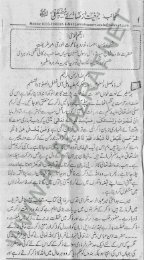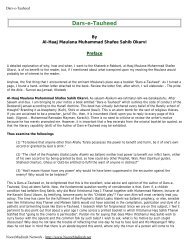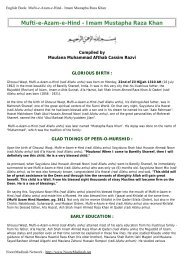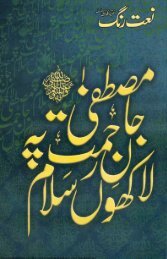Silsila-e-Chistiya - Noore Madinah Network
Silsila-e-Chistiya - Noore Madinah Network
Silsila-e-Chistiya - Noore Madinah Network
You also want an ePaper? Increase the reach of your titles
YUMPU automatically turns print PDFs into web optimized ePapers that Google loves.
<strong>Silsila</strong>-e-<strong>Chistiya</strong>
Sultan al-HindHadrat Muinuddin Hasan Chisti AjmeriKhawaja Gharib Nawaz(Radi Allahu ta'ala anhu)IntroductionSpiritual Guidance<strong>Silsila</strong>-e-<strong>Chistiya</strong>Spiritual AwakeningPir-o-MurshidKhalifah of <strong>Chistiya</strong> OrderMission as KhalifahThe Spiritual Genealogy of the Chishti OrderData Ganj BakshInstitution of IslamKhalifat-Allah actualisedRealm of Divine BeautyWords of Khawaja SahebReferences
IntroductionThe personal touch is important in guidance of the Ummah. Mere book knowledgeleads to varied translations and further division. A sick person needs both thephysician and the prescription. Often he needs the Doctor more than theprescription. Unless there is a competent physician to administer the prescriptionproperly, the prescription remains useless. Allah gave us both the physician and theprescription, The Beloved Prophet (Salla Allahu ta'ala alayhi wa Sallam) and theGlorious Qur’an. The Qur’an without The Beloved Prophet (Salla Allahu ta'ala alayhiwa Sallam) would not have ushered in the marvellous transformation, in Arabia,which is the pride of Islam.The functions of the Noble Physician have been described in the quoted verse of theQur’an al-Kareem. Accordingly the duties of the Beloved Prophet (Salla Allahu ta'alaalayhi wa Sallam) consist of the following:1. To read the signs (ayah) of Allah from the Qur’an and the environment, andthereby communicate the message of Allah2. To purify their souls, which is different from merely conveying the message.That is to purify them to understand the message.3. To explain the real significance of the passages of the Qur’an al-Kareem, suchunderstanding is received when the purification process synchronises theirinsight (basirah) and eyesight.4. Finally to bring them face to face with the wisdom which follows thisknowledge of the signs and action of purification.The Beloved Prophet (Salla Allahu ta'ala alayhi wa Sallam) combined in himself theleadership of all the various functions. He was the religious teacher, spiritual guide,social reformer, commander in chief and political head. The four Caliphs thatfollowed inherited this leadership in totality. The temporal power and spiritual leadwere centred in the same personality.Unfortunate events subsequent to the Martyrdom of Imam Hussain (radi allahuta'ala anhu) sounded the death knell of amalgamated leadership. The Bani Umayyausurped the temporal power, and the incident of Karbala and its aftermath paved theway for the modern ‘so called’ Islamic Nation States’ and the external (zahiri) brandof Islam, as followed by these leaders. Those who could see the reality however,continued to flock around the ahle bait to drink from the fountain of knowledge andreality. Under the Umayyad and Abbasid Caliphs these expounders of the internal
true Islam, or the Sufi Dervishes, were persecuted and that is why these spirituallessons were given secretly. The Beloved Prophet (Salla Allahu ta'ala alayhi waSallam) is the ocean, Hadrat Ali (radi allahu ta'ala anhu) is the outlet and the ahlebait are the canals that carry the water to the thirsty. The analysis of the events afterKarbala shows clearly how wealth and power corrupted the morals and respect forthe Ahl al-bayt. How deep this rot has set in today. Fortunate are those that areattached to Sufi Orders that have devised effective mechanisms to keep the loveof Ahl al-Bayt, and thus the soul of true Islam, alive in the heart of its adherent.
Spiritual GuidanceOn the return journey from his “Farewell Pilgrimage” the Beloved ProphetMuhammad (Salla Allahu ta'ala alayhi wa Sallam), on the 18 Dhul Hijjah stoppedat Ghadir-e-Khum, (which is close to today's Juhfah), an Oasis between Makkah and<strong>Madinah</strong>. It was a place where people from different regions would depart from eachother and take different routes for their home provinces. He called the gathering ofCompanions from the various tribes and after addressing them on important mattershe announced that he had received a message from Allah (Subhanahu wa ta'ala) todeclare as follows :- The Messenger of Allah (Salla Allahu ta'ala alayhi wa Sallam)declared: "It seems the time approached when I shall be called away (by Allah) and Ishall answer that call. I am leaving for you two precious things and if you hold fast toboth of them, you will never go astray after me. They are the Book of Allah and myprogeny that is my Ahl al-Bayt. The two shall never separate from each other untilthey come to me by the Pool (of Paradise)."Then the Beloved Messenger of Allah continued: "Do I not have more right over thebelievers than what they have over themselves?" People cried and answered: "Yes, O'Messenger of God." Then the Most Beloved Prophet (Salla Allahu ta'ala alayhi waSallam) held up the hand of Ali and said:“Man Kunto Maulaho Fa Aliun Maulaho, Allah humma Wala Man Walaho WaAada Man Aadaho” [1]“He whose spiritual guide I am, Hadrat Ali (Karam-allah wajhu) is also hisspiritual guide, Oh Allah, You keep him as Your friend who keeps him [ Hadrat Ali(Karam-allah wajhu)] as his friend (and spiritual guide) and You (Allah) treat himas Your enemy who treats him [Hadrat Ali (Karam-allah wajhu)] as his enemy.”It is narrated that Hadrat Umar (Radi allahu ta'ala anhu) and Hadrat AbuBakr (Radi allahu ta'ala anhu) were the first to congratulate Harat Ali (Radi allahuta'ala anhu). They ran up to him and said said:"Well done Ibn Abi Talib! Today you became the Spiritual Guide, (Mawla) of allbelieving men and women."
<strong>Silsila</strong>Hadrat Khawaja Muniuddin Chisti (Radi Allahu ta'ala anhu) popularly known asKhawaja Ghareeb Nawaaz (The Supporter of the Poor) is the mujaddid (reviver) ofthe <strong>Chistiya</strong> Order of Sufis. He is one of the most outstanding figures in the history ofIslamic Sufism.The <strong>Chistiya</strong> <strong>Silsila</strong>[2]1 is one of the most popular and influential Sufi orders inIslam. It derives its name from Chist, a village near Heerat, Afghanistan, where thefounder of the Order, Khawaja Abu Ishaq (Rahmatullahi alaihi) of Syria, settled.Hadrat Khawaja Muniuddin Chisti (Radi Allahu ta'ala anhu) brought the <strong>Silsila</strong> toIndia at the close of the 11th century A.D. and established its centre in Ajmer, whencethe order spread far and wide in India and became a force in the spiritual life of theMuslims.Hadrat Khawaja Muniuddin Chisti (Radi Allahu ta'ala anhu) was born in 536A.H./1141 A.D. at a place called Sanjar, in Sijistan (Persia or present day Iran). Hewas in direct lineage of the Beloved Prophet Muhammad (Salla Allahu ta'ala alayhiwa Sallam) being paternally descended from the Beloved Prophet’s grandson, ImamHussain (Radi allahu ta'ala anhu) and maternally from the Beloved Prophet’sgrandson, Imam Hasan (Radi allahu ta'ala anhu). Thus he is a Hasani and aHusayni Sayyad[3]. He was brought up in Khorasan, Iran and received his earlyeducation at home from his father, Hadrat Sayyad Gheyasuddin (Radi Allahu ta'alaanhu) At the age of 9 ; he committed the Qur’an al-kareem to memory. He was 16 yrsold when his father passed into the realm of Divine Beauty; he inherited a grindingstone and an orchard, which formed a source of his livelihood.1[2] <strong>Silsila</strong> The Spiritual Chain of each Sufi Order descends from the Beloved Prophet (Salla Allahu ta'ala alayhi waSallam) down to the present Spiritual Guide. It is through attachment to the silsila that the newly initiated disciplehas the means to travel to Allah under Divine Protection.
Spiritual AwakeningA Madhzoub[4]2 saint, Hadrat Ibrahim Qandoozi (Rahmatullahi alaihi) paid Khawaja Sahib(Radi Allahu ta'ala anhu) a visit at his orchard. Khawaja Sahib (Radi Allahu ta'alaanhu) laid out a sheet for him to sit on and offered him a few grapes from the garden.The saint ate some grapes, and then took out a piece of bread from his sack andchewed on it. He then took out the chewed bread from his mouth and placed it inKhawaja Sahib’s (Radi Allahu ta'ala anhu) mouth. An instant transformationoccurred, in keeping with the Sunnah [5] of the Beloved Prophet (Salla Allahu ta'alaalayhi wa Sallam). It is stated in at-Tabarani, that a slave girl, who was not verymodest, asked the Beloved Prophet (Salla Allahu ta'ala alayhi wa Sallam) for somefood whilst he was eating and he offered her some of the food in his plate. She refusedto accept it saying, “I want the food in your mouth.” He took some food out of hismouth and as soon as she ate it she was transformed into the most modest woman in<strong>Madinah</strong>.The saints of Allah (Subhanahu wa ta'ala) also practice the internal, spiritual Sunnahof the Beloved Prophet (Salla Allahu ta'ala alayhi wa Sallam). On eating the breadfrom Hadrat Ibrahim Qandoozi (Rahmatullahi alaihi), Khawaja Sahib (Radi Allahuta'ala anhu) penetrated the thin line separating the material world from the unseen:the inner organs of perception opened and so did his universe expand. The veil ofworldly imagination was lifted from his mind and he found himself in quite a strangeworld radiating with divine manifestation. The intellectual proof of Islam is foundamong the Ulema or scholars whilst the personification of 'surrender to the Will ofAllah' or the visible proof are the Awliya. The truth of the Beloved Prophet (SallaAllahu ta'ala alayhi wa Sallam)'s integrity is manifested through these Awliya.With this expanded view of the universe, Khawaja Sahib (Radi Allahu ta'ala anhu)went to his mother and with her permission left to acquire more knowledge of Islam(ilme din). Distributing all his worldly belongings to the poor, he went to Bukharaand Samarqand to join the famous Nizamia Universities there for his theologicaleducation. He studied under Hadrat Hussamuddin Bukhari (Rahmatullahi alaihi)and other great scholars. He completed his academic courses brilliantly in 9 years2[4] Madjzoub: One under the influence of Divine attraction (jadhba). The power of this attraction brings aboutspiritual intoxication (sukr) and indifference to all that is other than Allah. In being drawn towards Allah theMadjzoub experiences excessive ecstacy.
(552 AH to 561 AH). Adorned with the external knowledge of Islam (ilme zaahir) hefelt an urge to acquire recognition of his Creator (ilme baatin) and thus he sought aSpiritual Guide.The Spiritual Guide is the inheritor of The Beloved Prophet (Salla Allahu ta'alaalayhi wa Sallam) in his inner Spiritual State, in their outward behaviour and intheir roles as guides and protectors within their communities. Their Spiritual Hearts(qalb) [6] are capable of receiving light and love from Allah and radiating it to thosethat are in their attendance. A person may acquire any amount of external knowledge(ilm) but he cannot reach reality (haqiqah)[7] until he connects himself to a <strong>Silsila</strong>[8]via a physical present Guide of the <strong>Silsila</strong>, who has the powerful transference oroverflow from the Great Heart (qalb) of the Beloved Prophet (Salla Allahu ta'alaalayhi wa Sallam) down the unbroken chain of recipients.Mawlana Jala al-ddin Rume (Rahmatullahi alaihi) says:Ilme Baatin Hamchu masqa, Ilme zaahir hamchu sheerKe Buwad sheer masqa, ke buwad be Pir, PirInternal Knowledge (ilme baatin) is like butter and External Knowledge (ilme zaahir) is like milkLike butter cannot be acquired without milk, so to recognition of Allah (ilme baatin) cannot beobtained without a Spiritual Guide.Once while Mawlana Jala al-ddin Rume (Rahmatullahi alaihi) was teaching his pupils in theopen courtyard next to a fountain, a shabbily externally dressed but perfectly internallyadorned Sufi, Shams Tabrez (Rahmatullahi alaihi) came to their assembly and watched them.He saw Mawlana Rumi referring to numerous handwritten books in the course of histeaching. Shams asked Mawlana Jala al-ddin Rumi (Rahmatullahi alaihi) as to what was inthe books. Mawlana Jala al-ddin Rumi (Rahmatullahi alaihi) replied, “O! Sufi. This containsknowledge that is beyond your understanding so you continue to read your rosary (tasbih).”Unnoticed by Rumi, Hadrat Shams Tabrez (Rahmatullahi alaihi) threw all the books into thepond of water. When Mawlana Rumi’s students saw what occurred they began beating HadratShams Tabrez (Rahmatullahi alaihi). This and the screams of Shams Tabrez (Rahmatullahialaihi) alerted Mawlana Rumi as to what occurred. He complained that all his valuableknowledge had been destroyed. Shams Tabrez (Rahmatullahi alaihi) said; “Tell your pupils toleave me alone and I will give back your books.” A visibly dejected Rumi conceded to therequest thinking that this was impossible.He was surprised to see Shams Tabrez (Rahmatullahi alaihi), recite bismillah, lift thedrenched books from the pond, blew dust of them and returned them to him intact. He askedShams Tabrez (Rahmatullahi alaihi) as to how he did this. Shams Tabrez (Rahmatullahialaihi) replied, “This knowledge is beyond your understanding so you continue to teach yourpupils.” Mawlana Jalalludin Rumi (Rahmatullahi alaihi) fell at his feet and was swept into the
currents of love. The presence of this ragged Sufi, Shams Tabrez (Rahmatullahi alaihi),changed Mawlana Jala'al-ddin Rumi (Rahmatullahi alaihi) from a respected professor oftheology into a lover of God, one who summed up his whole life with the phrase, "I burnt, andI burnt, and I burnt." Shams Tabrez (Rahmatullahi alaihi), targeted Mawlana Rumi(Rahmatullahi alaihi) since he knew that Rumi was ready for receiving Spiritual Training butthe veil of conceit, regarding his knowledge, had to be lifted.Mawlana Jala'al-ddin Rume (Rahmatullahi alaihi) says :Sad kitaboh, sad waraq, dar nare kunAur jaanoh dil rah, janibeh, dil daar kunThrow all your books into the fireAnd turn with heart and soul to the AwliyaFor without them one cannot reach perfection.Maulvi hargis na shud Maula e RumeTa ghulame Shams Tabrizi na shudMawlana (religious teacher) Rume could never have become Maula Rume (Spiritual Guide)Without submitting to Spiritual Guide Shams TabrezMawlana Rume (Rahmatullahi alaihi) as the true inheritor of the internal state of the MostBeloved Prophet (Salla Allahu ta'ala alayhi wa Sallam) was so respected that the MuslimRuler of the time used to kiss his feet out of reverence.
Pir-o-MurshidMeeting With Hadrat Khawaja Uthman Harooni (Rahmatullahi Alaihi)Khawaja Sahib (Radi Allahu ta'ala anhu) undertook a journey to a place calledHarwan or Haroon. He became a disciple of Hadrat Khawaja Uthman Harooni(Rahmatullahi alaihi) a great Sufi of his time. Hadrat Khawaja MuniuddinChisti (Radi Allahu ta'ala anhu) was then consigned to a hujra[9] to worship Allah(ibaadat) and strive on the path (riyaazat). A day later his Guide asked him as towhat he could see and he replied, “I can see the seven heavens and the seven earths.”Khawaja Uthman Harooni (Rahmatullahi alaihi) said, “You are not ready yet.” andsent him back into the hujra. Another day passed and he was asked as to what hecould see and he replied, “I can see the abyss of the earth (tahtus sudra) and up to theDivine Throne (arsh).Again he got the reply “You are not ready yet” and was sent back into the hujra.Another day passed and on being questioned by his Pir he replied, ‘ I can see up tothe Glorious Veil (al-Hijab e Azmat) that veils the Creator from us and beyond theveil.” Khawaja Uthman Harooni (Rahmatullahi alaihi) then held out two fingers andasked him to look through them and say what he sees. He replied, “I can see the 1800universes.” Although some reports say the training lasted three years many say itlasted three days, and I favour this, since Khawaja Uthman Haruni (Rahmatullahialaihi) is reported to have said in Anis al-Arwah[10], “in our followers there isSpiritual Striving (mujaheda) of one day and one night only.”Allama Iqbal says:Har kasse az ramze ishq aga a nesstHar kasse shayane ee dargae nesstThe secret of love is not for everyoneSo the kissing of this great courtyard is not in everyone’s destiny.He remained in the company of his Peer-o-Murshid for 21 years and travelled withhim carrying his Murshid's belongings on his head. They travelled to Makkah,<strong>Madinah</strong>, Iraq, Syria, Samarqand, Afghanistan, etc. meeting many great saints. Whilethey were in Makkah in 562 AH, Hadrat Khawaja Uthman Harooni (Rahmatullahialaihi) took Hadrat Khawaja Muniuddin Chisti (Radi Allahu ta'ala anhu) tothe Ka'aba Shareef and prayed for him and a voice was heard declaring: "We haveaccepted Muhiyuddin as one of our beloved devotees."
In <strong>Madinah</strong> the Illuminated, while at the Noble Court of the Beloved Prophet (SallaAllahu ta'ala alayhi wa Sallam), Hadrat Khawaja Uthman Harooni (Rahmatullahialaihi) instructed Hadrat Khawaja Muinuddin Chisti (Radi Allahu ta'ala anhu) tooffer his homage and salutations respectfully. In doing so, a voice was heard saying,"Wa Alaykum as-Salaam Ya Qutb al-Mashaykh-e-bahr-o-bar (Peace be upon youalso, O, the Head of the Pious of the earth and the sea)." On hearing this his Pir-o-Murshid said to him, "Now indeed you have reached perfection."
KhalifahAfter full 20 years hard training in the Science of Spirituality (Tasawwuf) under thisgreat Spiritual Guide, at the age of 46, in the year 582 AH at Baghdad, HadratKhawaja Muniuddin (Radi Allahu ta'ala anhu) was awarded Khilafat3[11] in theChishtiya <strong>Silsila</strong>. His Murshid, after advising him, handed over his Sacred Staff (AsaMubarak), wooden sandals and prayer mat (Musallah) to Hadrat KhawajaMuniuddin (Radi Allahu ta'ala anhu) saying that those Tabbarukaats[12] havecome down from Sayyiduna Rasulullah (Salla Allahu ta'ala alayhi wa Sallam) insuccession. The association with his Spiritual Guide (Suhbat)[13] had now preparedhim for his mission. This fire of love is passed down the Spiritual Chain. Heartconnection is required to acquire it. A poet has rightly said:Qareeb Jalte huwe dil keh apna dil karlehYeh aag lagti nahi. Lagahi jati heh.Take yourself close to the heart aflame with Divine LoveThis fire cannot be ignited it has to be attained.3[11] Khilafat : An official Award of Commission, on spiritual perfection, to guide others.
MissionHis Mission as a Khalifa of The Chishtiya OrderAfter ordaining him as a Spiritual Guide, Khawaja Uthman Harooni (Rahmatullahialaihi) embraced Khawaja Muniuddin (Radi Allahu ta'ala anhu), affectionately,kissed his forehead and said, "I entrust you to God". Khawaja Muniuddin (RadiAllahu ta'ala anhu) then departed with a heavy heart on the mission entrusted tohim. (Anis ul-Arwah). During his tour onwards, a fourteen-year-old boy, QutbuddinBakhtyar Awashi (Born 569 A.H.) approached him at Asfahan in 583 A.H and wasinitiated as his spiritual disciple (mureed). Khawaja Qutbuddin (Rahmatullahialaihi) was the first disciple of Khawaja Saheb and he accompanied him on his tour.Khawaja Saheb received 'Beshara' [16] or prophecy in dream from the BelovedProphet (Salla Allahu ta'ala alayhi wa Sallam) in 586 A.H, to grant Khawaja Qutub,Khilafat at an early age of seventeen years. Khawaja Qutbuddin (Rahmatullahialaihi) was a born saint. His mother was a Hafizah of half of the Qur’an al-Kareem and she recited Qur’an daily during her pregnancy. He thereforeremembered by heart, half of the Qur’an al-Kareem by Allah's grace while he was stillin his mother's womb. Khawaja Saheb during his tour (583 585 A.H.) visited manyplaces including Makkah and <strong>Madinah</strong>.He performed Hajj and whilst at the Ka'aba Shareef he heard a Voice declaring. "0Muniuddin we are pleased with you; you may ask anything you like." He replied, "OAlmighty Allah, I only pray for the grace of your pardon to Muniuddin’s silsila ofdisciples." Allah answered: "O Muniuddin, You are our beloved devotee we shallpardon your 'murids' and also others who become so in your Spiritual order up toThe Day of Judgement. He then went to <strong>Madinah</strong> and remained in devotion for along time. One night he had a Basharat' from the Beloved Prophet (Salla Allahuta'ala alayhi wa Sallam) who said; "O Muinuddin, you are the promoter of ourreligion. We put India under your charge where darkness prevails." Go to Ajmer.With your presence the darkness will disappear and Islam shall shine. God will helpyou." Khawaja Muniuddin was much pleased with being given an assignment by theMost Beloved of Allah (Salla Allahu ta'ala alayhi wa Sallam) but wondered aboutthe geographical position of Ajmer. He was again blessed with a vision of the BelovedProphet (Salla Allahu ta'ala alayhi wa Sallam) and shown a map with the exactposition of Ajmer with its surrounding hills and fort.
Resuming his journey through Hamadan, Tabrez, Isfahan, Khirqan, Astrabad, andHeerat, meeting notable saints in his way he reached Sabzawar in Afghanistan wherehe converted the governor of the place, Yadgar Muhammad who was cruel andhaughty and was a Shia by faith, who did not recognise and respect the first threeCaliphs of Islam, neither had any respect for Sufis nor for any pious Saints. One lookof grace from Khawaja Saheb caused Yadgar Muhammad to repent. He distributedhis wealth among the poor and needy, divorced his many wives, freed all his slavesand renouncing the world, became one of the ardent devotees of Hadrat KhawajaMuniuddin Chisti (Radi Allahu ta'ala anhu), (Tazkarat al-Awliya). Before enteringIndia in 587 A.H., he healed the suffering humanity throughout his journey, visitingBalkh and Ghazi as well. He proceeded to Delhi via Fort Shadman, Multan, Lahoreand Samana.
GenealogyThe Spiritual Genealogy of the Chishti OrderThe Beloved Prophet Muhammad Mustafa(peace and the blessings of Allah be upon him and his family anddescendents)Hadrat Sayyadina Ali al-Murtada (alaihi as-salaam)Khawaja Hasan BasriHadrat Shaykh Abdul Wahid bin ZaidKhawaja Fuzail bin AyezKhawaja Sultan Ibrahim bin Adhem of BalkhHadrat Khawaja Sadeeduddin Khadeefa MarasheeHadrat Khawaja Abee Hubera BasriHadrat Shaykh Mumshad Alu DenooriChishtiHadrat Khawaja Abu Ishaq Shami ChishtiHadrat Shaikh Abu Ahmed ChishtiHadrat Shaikh Abu Mohammed ChishtiHadrat Khawaja Abu Yusuf ChishtiHadrat Khawaja Moudoud ChishtiHadrat Shaykh Khawaja Hajji Sharif ZindaniHadrat Khawaja Uthman HarooniHadrat Khawaja Muinuddin Hasan Chishti of Sanjar and AjmerThe successors of Hadrat Khawaja Muinuddin Hasan ChishtiHadrat Khawaja Qutubuddin Bakhtiar KakiHadrat Baba Fariduddin Masud Ganj-i-ShakarHadrat Khawaja Nizamuddin AuliaHadrat Khawaja Nasiruddin Chirag DehlaviHadrat Baba Farid Masud Ganj-i-Shakar
The Sabri OrderHadrat Alauddin Ali Ahmad Sabir and his caliphHadrat Shamsuddin Turk of PanipatFrom Hadrat Nizamuddin Awliya also aroseThe Nizami Order.Two other of his caliphs also continued the spread of the order in South India,Hadrat Burhanuddin Gharib and Hadrat Sayyad Gesu DarazRidwan-Allah ta'ala 'alaihim'ajmain
Data Ganj BakshAt the Holy Court of Data Ganj Baksh (Rahmatullahi alaihi)At Lahore Khawaja Saheb stayed for forty days at the shrine of Hadrat MakhdoomSayyad Ali Hujweri (Rahmatullahi alaihi), a descendant of the Beloved Prophet(Salla Allahu ta'ala alayhi wa Sallam) who is popularly known as Data Ganj Baksh(Rahmatullahi alaihi). Hadrat Sayyad Ali Hujweri (Rahmatullahi alaihi) is a wali ofsuch a high status, that it is stated that Ghawth al-A'zam as-Sayyad Shaykh Abd' al-Qadir al-Jilani (Radi Allahu ta'ala anhu) said, when he was once mentioned in hisgathering, “I, Abd al-Qadir, would have taken him as my Spiritual Guide if I was bornin his time.” Khawaja Saheb (Radi Allahu ta'ala anhu) who had reached such a highspiritual status, had such respect for Data Sahib, that he spent forty days at the feet ofData Saheb (Rahmatullahi alaihi). Before leaving Lahore he offered the followingcouplet in appreciation of Ali Hujwiri (Rahmatullahi alaihi)’s status:Ganj Baksh Faize Alam Mazhare Nure KhudaNaqesara Ra Pir e Kamil Kamila Ra Rahnuma.He is a bestower of treasure (Ganj Baksh) reflecting Divine Light for the salvation ofmankind.To the unworthy he is a perfect guide, but to perfect souls, he is still a guideThis couplet has made him famous forever as 'Data Ganj Baksh (Rahmatullahialaihi). In what high esteem must adherents of the Chishtiya Spiritual Order hold thisMazhaar of Data Saheb (Rahmatullahi alaihi) where the Sovereign of the ChishtiyaOrder, Khawaja Saheb (Radi Allahu ta'ala anhu) spent forty days? KhawajaNizamuddin Aulia (Rahmatullahi alaihi) reports that I saw the BelovedProphet (Salla Allahu ta'ala alayhi wa Sallam) entering the Mazhaar of my Shaykh,Hadrat Baba Fariduddin Ganje Shakar (Rahmatullahi alaihi) and he, the BelovedProphet (Salla Allahu ta'ala alayhi wa Sallam) exclaimed:Man dakhala hazihi baaba faqat aminaWhosoever enters through this door will enter paradiseTherefore this door is called ‘The Door to Paradise” or Behisti Darwaza. How greatmust the status of Baba Farid Ganje Shakar (Rahmatullahi alaihi) be ?
A poet has said:Jis neh is dar peh gardan jukayi,ban gaya who Mahboobe IlahiDekoh Kalyar meh jah,Khawaja Saabir Piya heh yagaanaTera kaahim Rahe aastana.Khawaja Ganje Shakar, kar karam ki nazarTera kaahim Rahe aastana.It is stated that this great wali, Baba Farid (Rahmatullahi alaihi) used to visit theMazaar of Data Saheb (Rahmatullahi alaihi), he used to show such reverence that heswept the forecourt of the mazaar with his beard.
Islam in IndiaIslamic history records in golden letters that only Hadrat Khawaja Muniuddin Chisti(Radi Allahu ta'ala anhu) and no one else instituted the everlasting spirit of Islam inthe Sub-Continent. He conquered the hearts of Indian people without any army. Itwas a grand spiritual victory that must stand high among all political victories of theworld. What Ghaznavi, Lodhi and Ghauri could not do with their army, KhawajaMuniuddin (Radi Allahu ta'ala anhu) did with wisdom and love. He conqueredIndia, not by the sword but by winning the hearts with love and strong character ashas been said by Hadrat Nizamuddin Awlia (Rahmatullahi alaihi) in Fawaid-ul-Fuad[17] : "None can be converted to Islam either by sword or by dialogue; but goodcharacter is more effective than sword or dialogue. Before converting someone it ismost essential that one must first be a real Muslim."
Khalifat-AllahThe Hindu ruler of India, Prithvi Raj challenged Khawaja Muniuddin, unsuccessfully,on many occasions. The ruler sent a Hindu Priest, Shadi Dev or Ram Deo to persuadeKhawaja Saheb (Radi Allahu ta'ala anhu)to leave the area and not to use the water ofthe Anasagar Lake for ablution, since it was a Hindu Holy lake. Khawaja Saheb (RadiAllahu ta'ala anhu) requested that he be allowed to fill one water bag. Permissionwas granted and on Khawaja Sahibs (Radi Allahu ta'ala anhu) orders, KhawajaQutbuddin (Radi Allahu ta'ala anhu) went to fill the water bag. The entire lakedisappeared into the water-skin bag. Shaadi Ram was awestruck by the magnetic andmiraculous personality of Khawaja Saheb (Radi Allahu ta'ala anhu). He hesitantlyprotested and Khawaja Saheb (Radi Allahu ta'ala anhu) told him, ‘O! Shaadi. I cansee the light of Islam on your forehead. Testify that ‘None is worthy of worship exceptthe One True God”. He at once accepted Islam and was named Saadi. This created astir amongst the Hindus. Thousands now accepted Islam.The Hindu ruler now sent his greatest magician, Ajaipal, to challenge Khawaja Saheb(Radi Allahu ta'ala anhu). After failing in many attacks on Khawaja Saheb (RadiAllahu ta'ala anhu) he finally flew into the air on a deerskin and asked KhawajaSaheb (Radi Allahu ta'ala anhu) to better this feat. Khawaja Saheb (Radi Allahuta'ala anhu) ordered his wooden sandals to fly up into the air and beat the head ofAjipal and bring him down. We may think that these are fictitious stories. No! This isIslam and this is man acting in his capacity as Khalifat-Allah[18] actualised. . Thegoal of Islam is not to grope in the dark. The Qur’an al-Kareem describes the functionof Islam in Sura al-Baqara 2: Verse 257'Allah is the protecting friend of those who believe in Him genuinely andHe takes them out of darkness into the light'If the goal is to imbue ourselves with Divine Attributes- to become Khalifat-Allahactualised then the natural function is interference. This interference by man ispossible on the lower level of physical science and at the higer level of spiritualscience or spirituality. The Khalifat-Allah as one totally submitted to Allah can dogreater wonders than the physical scientist.Love to all and Malice to none, along with Service to humanity was the foundationstone laid by Khawaja Muniuddin Chisti (Radi Allahu ta'ala anhu) for the successfulspread of Islam in India. Representatives of the Chishtiya Order are working up to
the present day on the same line. Khawaja Saheb (Radi Allahu ta'ala anhu) usedgreat wisdom in presenting Islam to the people of India. He Islamicised prevalentactivities, in keeping with their culture, and presented other ‘enjoyable’ activities tothem, especially designed to attract them to Islam. Although 'qawwal and chanting'popularly known as 'Sama' is not new to Sufis wherever they are, Sultan al-Hind,Gharib Nawaaz Khawaja Muniuddin Hasan Chishti (Radi Allahu ta'ala anhu)specially arranged and patronised these concerts to capture and mould the heart ofhis audience for accepting the Divine Message gracefully.Thousands of Muslims and non-Muslims listen to it in rapt attention wherever theseSufi functions are held by the representatives of Chishtiya Order and derive spiritualbenefits. It is through these methods that the Sufis, slowly and patiently, awaken theSpiritual Heart, to love Allah and the Most Beloved Sayyadina Rasulullah (SallaAllahu ta'ala alayhi wa Sallam), resulting in those astray coming to the straightpath.
Divine BeautyPassing into the Realm of Divine BeautySultan al-Hind Khawaja Muniuddin Hasan Chisti (Radi Allahu ta'ala anhu) passedinto the realm of Divine Beauty on the 6 Rajab 633 AH/1233 AD at the age of 97. Onhis passing he had the unique honour of knowing that 9.9 million had accepted Islamin India due to his efforts.Article courtesy of ;Irshad Soofi Chisti Nizami Habibi Sufi (S.Africa) 20 Rajab 1414; 17 September 2003
Words of Khawaja SahebWords of the final Khutbah of Hadrat Khawaja Mu'inuddin Chishti (r.a.) delivered tohis followers just one month before his demise.Love all and hate none.Mere talk of peace will avail you naught.Mere talk of Allah and religion will not take you far.Bring out all of the latent powers of your beingAnd reveal the full magnificenceof your immortal self.Be surcharged with peace and joy,And scatter them wherever you areand wherever you go.Be a blazing fire of truth,And be a soothing balm of peace. With your spiritual light,dispel the darkness of ignorance;and spread goodwill, peace, and harmony among the people.Never seek any help, charity, or favorsfrom anybody except Allah.Never go to the courts of kings,but never refuse to bless and help the needy and the poor,the widow, and the orphan, if they come to your door.This is your mission, to serve the people....Carry it out dutifully and courageously,so that I, as your Pir-o-Murshid,may not be ashamed of any shortcomings on your partbefore the Almighty Allah and our holy predecessorsin the Sufi order (silsilah)on the Day of Judgment
References1[1] Sahih Tirmidhi, v2, p298, v5, p631[3] Sayyad: ‘Master.’ This title is given to a descendant of the Beloved Prophet (Salla Allahuta'ala alayhi wa Sallam), descending from his daughter Fatimah (Radi Allahu ta'ala anha).1[5] Ash Shifa: Qadi Iyad ibn Musa al-Yashubi: translated by Aisha Abdurahman Bewley:<strong>Madinah</strong> Press, Granada, Spain. Page 179/180.1[6] Qur’an al-Kareem Sura al-Anaam 6 Verse 1221[7] The power to connect to Allah.1[8] <strong>Silsila</strong> The Spiritual Chain of each Sufi Order descends from the Beloved Prophet (SallaAllahu ta'ala alayhi wa Sallam) down to the present Spiritual Guide.1[9] A room for conducting spiritual exercises.1[10] A written record of the discourses of Khawaja Uthman Harooni by Khawaja MuniuddinChisti .1[12] Tabarruqat: Sacred Relics1[13] Suhba: The Spiritual Companionship between guide and disciple. It is the pouring oflove of Allah into the Murids heart whilst increasing the hearts capacity to absorb.1[14] Lauh al-Mahfuz: The Divinely Inscribed Tablet upon which the destiny of all creation iswritten.1[15] Al-Fuyuuzaat ar-Rabbaaniyya: Ismail Muhammad Said al-Qadiri: al-Baz Publishing:The Wine Ode: al-Khamriyya Page 831[16] Beshara: Glad tidings that reach the heart. This may be announced to a Sufi in hisdream or within his Spiritual State (hal)1[17] The discourses of Hadrat Nizamuddin Awlia as recorded by his disciple Amir HassanSijzi.1[18] The God given innate ability to man to imbue himself with Divine Attributes
















